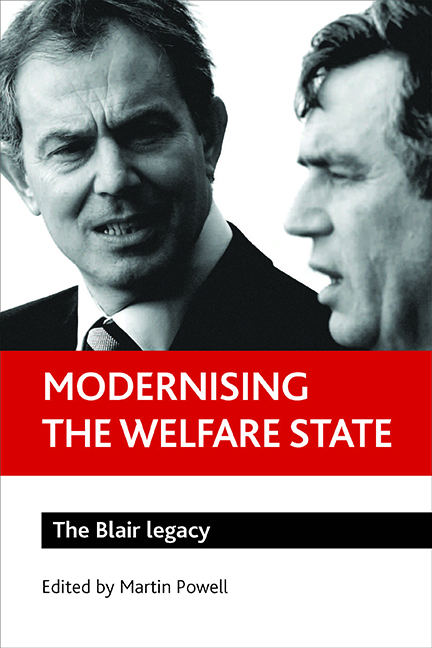Book contents
- Frontmatter
- Contents
- List of tables and figures
- Acknowledgements
- Notes on contributors
- one Introduction: modernising the welfare state
- two The NHS after 10 years of New Labour
- three Housing policy: coming in out of the cold?
- four Social security and welfare reform
- five Social care under Blair: are social care services more modern?
- six Education: from the comprehensive to the individual
- seven Controlling crime and disorder: the Labour legacy
- eight Social investment: the discourse and the dimensions of change
- nine Risk and the Blair legacy
- ten Going private?
- eleven Choice in public services: ‘no choice but to choose!’
- twelve The conditional welfare state
- thirteen The stages of New Labour
- fourteen Social Democratic reforms of the welfare state: Germany and the UK compared
- fifteen Conclusion: the Blair legacy
- Index
- Also available from The Policy Press
four - Social security and welfare reform
Published online by Cambridge University Press: 21 January 2022
- Frontmatter
- Contents
- List of tables and figures
- Acknowledgements
- Notes on contributors
- one Introduction: modernising the welfare state
- two The NHS after 10 years of New Labour
- three Housing policy: coming in out of the cold?
- four Social security and welfare reform
- five Social care under Blair: are social care services more modern?
- six Education: from the comprehensive to the individual
- seven Controlling crime and disorder: the Labour legacy
- eight Social investment: the discourse and the dimensions of change
- nine Risk and the Blair legacy
- ten Going private?
- eleven Choice in public services: ‘no choice but to choose!’
- twelve The conditional welfare state
- thirteen The stages of New Labour
- fourteen Social Democratic reforms of the welfare state: Germany and the UK compared
- fifteen Conclusion: the Blair legacy
- Index
- Also available from The Policy Press
Summary
Introduction
The UK social security system is a huge, complex juggernaut that has grown in a largely incremental way over at least the last century (McKay and Rowlingson, 1998). Government spending on social protection (principally social security benefits) takes up around £159 billion, well over one quarter of all public spending and more than the total raised in income tax (£154 billion) (HM Treasury, 2007). Radical reform is rare as the system affects the lives of so many people: state support is received by 70% of households in the UK, with 30% receiving at least half their income from this source (Family Resources Survey 2005-06, Table 3.9 – see www.dwp.gov.uk/asd/frs/2005_06/index.asp). Changes in one part of the system impact, sometimes in unanticipated ways, on others. Even the (apparently) radical Beveridge reforms (1942), often cited as creating the foundations of the modern social security system, built heavily on the past. For example, the principle of collective social insurance had already been established by the reforms of the earlier Liberal governments, and Beveridge deliberately set out to preserve the role of the private sector, particularly in relation to saving for retirement. And while Beveridge hoped to reduce the long-established role of means testing in the social security system, his hopes were not realised, and means testing remains a key feature of the UK system.
So radical change, or ‘third order’ change (Hall, 1993), is rare in the social security system and 10 years of New Labour have, in the main, failed to achieve such change. There remains a large role for means-tested benefits, immersed in a system of flat-rate social insurance (especially for pensioners) with various universal benefits in particular for people with disabilities. Someone familiar with the benefits system in 1997 would understand much of the system prevailing in 2007. And in many respects, New Labour continued with similar policy goals to the previous Conservative government, particularly in relation to the focus on moving people from welfare to work. However, there have also been some significant changes in policy goals compared with previous administrations, not least making poverty reduction a top priority for government action.
- Type
- Chapter
- Information
- Modernising the Welfare StateThe Blair Legacy, pp. 53 - 72Publisher: Bristol University PressPrint publication year: 2008



